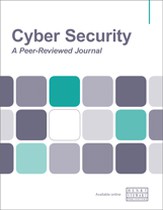The imperative of enterprise-grade security for 5G
Abstract
5G is a major transformational technology, the impact of which will largely be on enterprises and government users. This is a radical change from previous generations of mobile technology, including 3G and 4G, which were arguably largely used by consumers. In contrast, 5G will enable digital transformation of entire industry sectors and government activities and will come to underpin entire economies. Security technologies used in the past (and in many current networks) are incapable of securing the 5G opportunity of the future. Security for 3G and 4G was not focused on detecting and preventing attacks on all layers, all locations/interfaces, all attack vectors and all software life cycle stages. For example, there are no security mechanisms in 3G and 4G networks that can detect and prevent attacks from infected devices/botnets. This paper explains why, given the mission criticality of 5G, its security must be enterprise-grade. The paper further explains what ‘enterprise-grade’ security means.
The full article is available to subscribers to the journal.
Author's Biography
Leonid Burakovsky currently serves as a Senior Director of Product Management at Palo Alto Networks. Leonid pioneered a new area of products to strengthen 4G and 5G security. He is a co-inventor and an author of 25 granted 5G/4G security patents. Leonid contributed to the Open RAN Policy Coalition ‘Open RAN security in 5G’ April 2021 paper. He also initiated and led the creation of the new GSMA permanent security reference document, FS.37, which provides recommendations for communication service providers to detect and prevent attacks and security threats against mobile networks, services and applications. Prior to this role, Leonid served as F5 Networks’ Senior Director of Service Provider Solutions and Juniper Networks’ Strategic Alliances CTO. Leonid regularly speaks at industry forums such as IEEE, Mobile World Congress, NGMN, 4G, CTIA, Futurecom, BroadbandForum, LTE events, Intel’s Network Builders, to name a few. He has more than 30 years’ industry experience and holds both a Bachelor’s and Master’s degree in information systems engineering.
Danielle Kriz joined Palo Alto Networks in February 2016 as Senior Director of Global Policy. In this position, she leads the company’s engagement with governments around the world on cyber security and other public policy issues that affect Palo Alto Networks and its customers, including 5G security and Internet of Things (IoT) security. Danielle has 26 years’ technology, cyber security and trade policy experience. She previously was Director for Global Cybersecurity Policy at the Information Technology Industry Council (ITI), an influential Washington, DC-based trade association representing the world’s largest technology companies. Prior to ITI, Danielle spent four years in Silicon Valley consulting on government strategies for high-tech and clean-tech companies. She began her career with ten years in the US Government, working on high-tech trade policies first at the US International Trade Commission and then the US Department of Commerce’s International Trade Administration, where she spearheaded the US Government’s work on cyber security as it intersects with international trade. Danielle has worked with governments and engaged on cyber security policies in the US, the EU, Australia, Japan, UK, Singapore, China, India, Korea, Brazil and many others. Danielle has an MS in foreign service from Georgetown University, with a focus on international trade and technology policy, and a BA in politics from Ithaca College. She lived in Tokyo from 1991–4.
